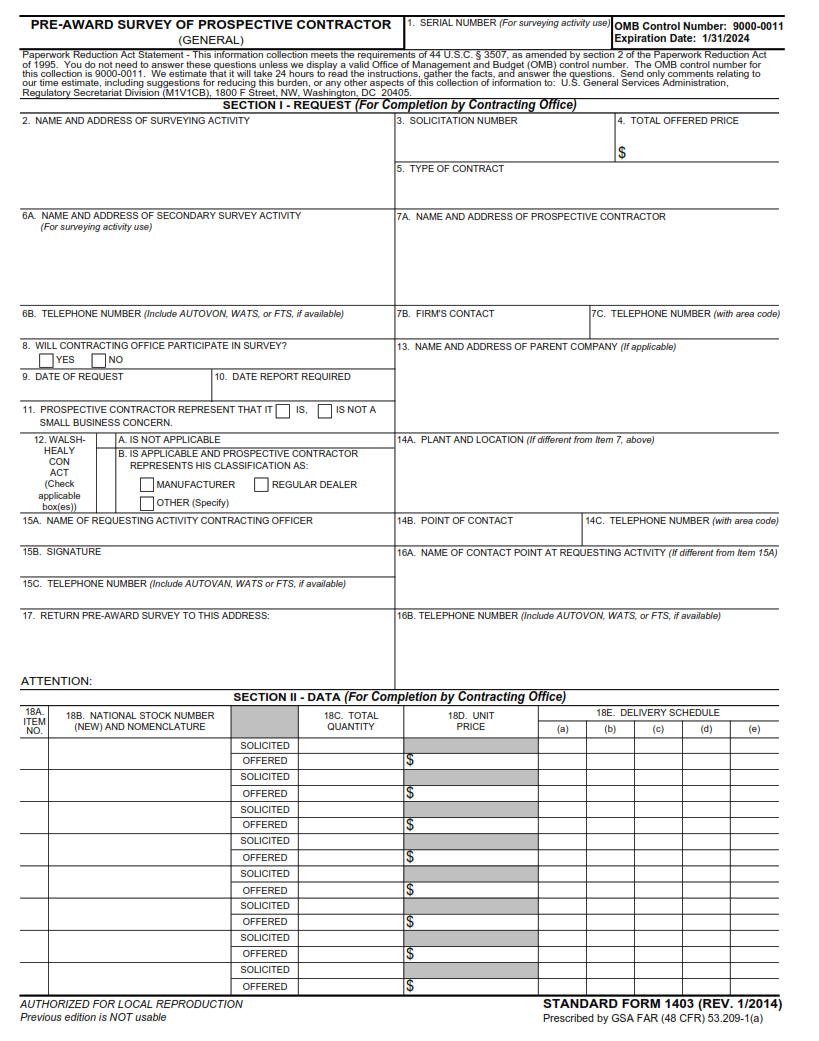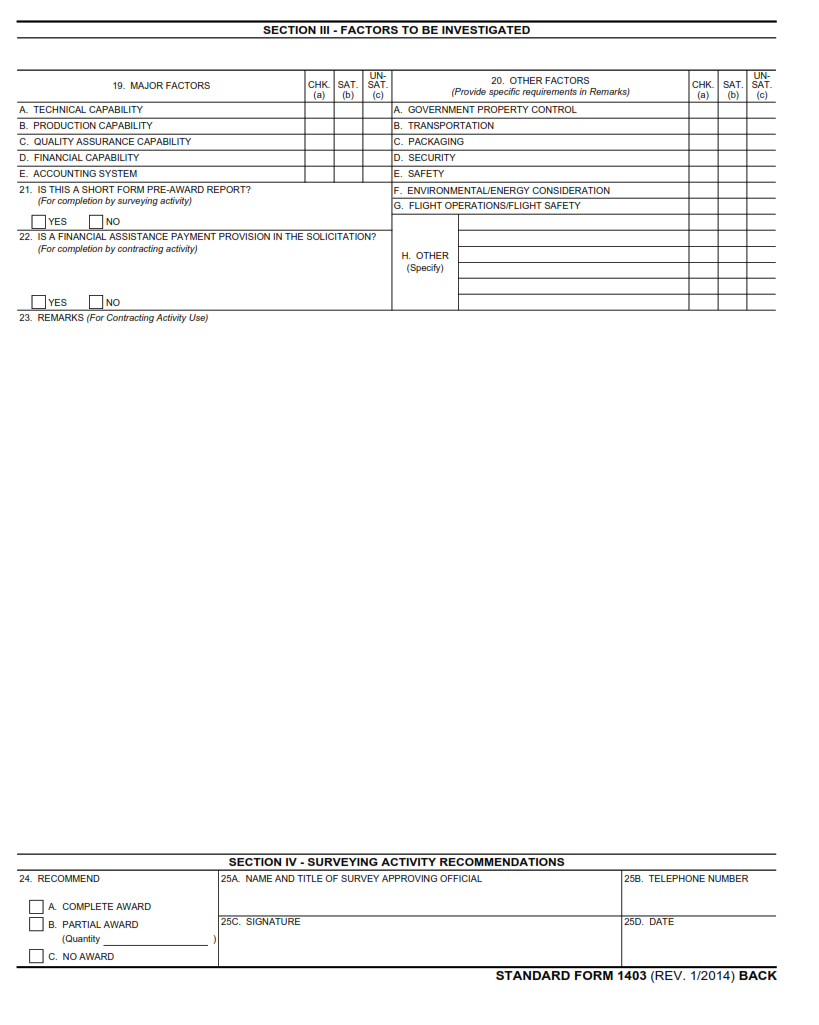SFFORMS.COM – SF 1403 Form – Pre-Award Survey of Prospective Contractors (General) – The SF 1403 form is a crucial document in the pre-award process for government contracts. It serves as a survey of prospective contractors and helps the contracting officer determine whether the bidder has the necessary financial, technical, and organizational capabilities to successfully carry out the contract.
Download SF 1403 Form – Pre-Award Survey of Prospective Contractor (General)
| Form Number | SF 1403 Form |
| Form Title | Pre-Award Survey of Prospective Contractor (General) |
| File Size | 797 KB |
| Date | 01/2014 |
What is a SF 1403 Form?
The SF 1403 Form is a Pre-Award Survey of Prospective Contractor (General) that is used by the US government to determine if a contractor is suitable for awarding a contract. The form provides information about the contractor’s financial and technical capabilities, as well as their past performance on similar contracts.
The SF 1403 Form helps the government assess whether the contractor has the necessary resources, experience, and track record to successfully complete the work. It also helps identify any potential risks or issues that may arise during the contract period.
Contractors are typically required to submit an SF 1403 Form when bidding on large government contracts. The form must be completed accurately and in full before it can be considered by the government agency responsible for awarding the contract. Overall, this form plays a crucial role in ensuring that only qualified contractors are awarded government contracts, ultimately protecting both taxpayers’ money and national interests.
What is the Purpose of SF 1403 Form?
The SF 1403 Form is an essential document for any organization seeking to secure a government contract. This form serves as the Pre-Award Survey of Prospective Contractor, which is conducted by government agencies before awarding contracts to ensure that contractors are capable of performing the work required. The purpose of the SF 1403 Form is to assess a contractor’s ability to meet specific criteria, such as technical competence, financial stability, and past performance.
The SF 1403 Form provides government agencies with valuable insights into prospective contractors’ capabilities and helps them make informed decisions when awarding contracts. By submitting this form, contractors can demonstrate their readiness and willingness to perform the work required in accordance with all applicable laws and regulations. In addition, completing an SF 1403 Form can help a contractor identify areas where they may need to improve their operations or processes before bidding on future contracts.
Overall, the SF 1403 Form plays a crucial role in ensuring that government contracts are awarded fairly and that contractors are held accountable for meeting high standards of performance. It provides transparency and accountability in the procurement process while also giving contractors an opportunity to showcase their abilities and compete for valuable government work.
Where Can I Find a SF 1403 Form?
The SF 1403 Form is a critical document required by the US government when awarding contracts to prospective contractors. It serves as an essential tool used by contracting officers to evaluate the financial, technical, and managerial capabilities of companies bidding for federal contracts. The SF 1403 Form provides a standard format that contractors must use to report specific information about their business operations, including organizational structure, accounting systems, past performance records, equipment capacity and capabilities, and other relevant data.
To obtain an SF 1403 Form, prospective contractors can visit the General Services Administration (GSA) website or contact their local GSA office directly. Alternatively, they can also request the form from any federal agency responsible for administering procurement activities. It’s important to note that there are several versions of the SF 1403 Form available online; therefore, it’s crucial to ensure that you select the correct version applicable to your particular contract proposal.
In conclusion, obtaining an SF 1403 form is a vital step towards securing federal government contracts. As such it’s essential for bidders seeking such opportunities to have access to accurate information on where and how they can get this critical document. By following simple steps like visiting GSA websites or contacting local GSA offices or federal agencies responsible for administering procurement activities in your area; businesses can quickly acquire this important pre-award survey form and be well on their way towards winning lucrative government contracts.
SF 1403 Form – Pre-Award Survey of Prospective Contractor (General)
The SF 1403 Form, also referred to as the Pre-Award Survey of Prospective Contractor (General), is a document that contracting officers use to assess the financial and technical capabilities of potential contractors before awarding contracts. The form contains a series of questions related to various aspects of a contractor’s business operations, including legal structure, management experience, financial resources, and production capabilities.
One primary goal of the SF 1403 Form is to ensure that prospective contractors are capable of meeting the requirements outlined in solicitations issued by government agencies. By evaluating key factors such as past performance and capacity, contracting officers can make informed decisions about which contractors are best suited for specific projects. In some cases, completing an SF 1403 Form may be mandatory for companies seeking federal contracts.
Overall, the SF 1403 Form plays an essential role in streamlining the procurement process while promoting transparency and accountability. By requiring potential contractors to provide detailed information about their operations and capabilities upfront, contracting officers can make more informed decisions about which companies are best suited for specific projects. Additionally, this process helps mitigate risks associated with contract non-performance or other issues that could negatively impact project outcomes.
SF 1403 Form Example

